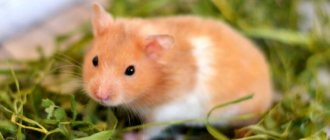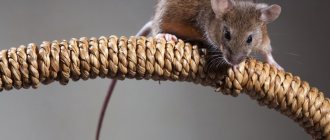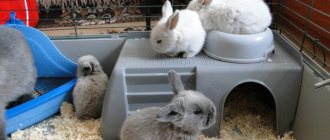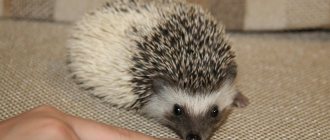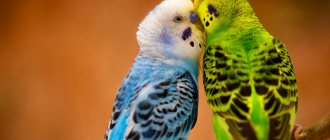- Symptoms of torpor in hamsters
If you decide to get a new family member, namely a hamster, you need to get acquainted with the life cycles of a small pet. It is especially important to know about the sleeping and waking patterns of a small creature. After all, sometimes it happens that the animal suddenly becomes numb, and it is not clear whether the homa has died or is sleeping. Information about how much hamsters sleep and what time of day is best to play with them is also important.
How long does a hamster sleep and at what time?
Hamsters are nocturnal. They sleep during the day and are awake at night. In its natural habitat, a hamster has many natural enemies. During the day, many predators do not sleep and are actively searching for food, but at night there are much fewer of them. This is the reason for the nocturnal lifestyle of hamsters.
The “common hamster” breed is the largest. Individuals of this breed reach a body size of up to 34 cm.
The duration of sleep depends on the size and breed characteristics of the rodents. The average sleep requirement for a dzhungarika is 8 hours, and for larger breeds – from 10 hours.
When kept at home, you may notice that hamsters stay awake throughout the night and often interfere with the owners' rest, so it is not recommended to place the cage in the bedroom.
The owner can influence the hamster's sleep patterns by creating different conditions. If you systematically wake up the hamster during the daytime and keep him busy with games and maintain the appropriate environment, then the hamster’s sleep pattern will change from daytime to nighttime.
A hamster's sleep rate also depends on age. Young hamsters sleep no more than 6 or 8 hours a day, but older hamsters can sleep more than 18 hours a day.
A healthy hamster sleeps much more than usual if:
- the owner does not pay attention;
- the hamster does not have the opportunity to explore the environment;
- There is no need to look for food in your cage.
With active interaction with the owner, the hamster stays awake much longer than without showing attention to him. In order for the hamster to sleep less without communicating with the owner, it is important to add new toys to the cage - wheels, ladders, labyrinths.
When moving to a new cage, when a new toy or house appears, the hamster sleeps for about 3 hours. The fact is that he spends a lot of time to explore a new space or object, including sleep time.
Stress changes the length of time an animal sleeps. In stressful situations, rest time decreases and the period of wakefulness increases. The normal average sleep duration for a hamster is 8-12 hours.
During the daytime, the cage should not be exposed to direct sunlight - this is important for normalizing the animal’s sleep.
Diurnal or nocturnal animal
In the wild, representatives of the hamster family are nocturnal animals. During the day they sleep. These habits have also been preserved in domestic pets.
Is it possible to wake up a pet during the day?
Waking rodents during the day is prohibited. Attempts by the owners to change the animal’s regime will become a great stress for it, will lead to the development of pathologies, and will negatively affect life expectancy. It is better to let the hamster sleep. An awakened pet becomes aggressive and irritable. It can bite its owner if he reaches out his hand.
Why does a hamster sleep all the time?
The reason why a hamster constantly sleeps may be a change of residence or a move. During the first week, the animal hardly rests, as it actively explores the new territory and arranges its home. Then the adaptation is completed, the pet needs to relax. During this period, sleep can be up to 20 hours daily. The rodent leaves the house only for food or water. This behavior is normal and does not require intervention from the owners.
The hamster sleeps constantly due to a change of residence.
Inactivity is also possible due to illness. Take your pet to a veterinarian if the following symptoms are observed:
- sleep for 20 hours a day or more;
- lethargy, lack of interest in toys, communication with owners;
- loss of appetite to complete absence;
- aggressive behavior;
- weakness, difficulty moving around the cage;
- discharge from the nose or eyes;
- dull, matted fur;
- wet tail;
- wet fur on the chin, neck;
- lack of washing, licking;
- stool disorders, changes in the appearance or consistency of droppings.
Timely treatment will help save the animal.
How and where does a hamster sleep?
Sleep patterns primarily depend on the hamster himself. For each animal it is individual. They usually sleep in a house inside a cage. For a comfortable rest for your pet, it is best to put toilet paper or regular napkins without patterns in the cage. The hamster himself will pick it up and drag it to his nest. The hamster will arrange a place to sleep on his own.
Under no circumstances should you give your hamster rags or cotton wool, as he may eat these materials. It is also not recommended to use soft toilet paper, as it contains fine dust that causes allergies in rodents.
Hamsters look very cute while sleeping. They can snore, twitch their paws and tenderly cover their faces. They sleep mostly buried in paper or sawdust.
Mode change
Many owners ask the question: “Is it possible to somehow change the pet’s daily routine?” Partly they can be understood, because it is unbearable to listen to the sounds of an animal running around a cage and other noise every night. But you shouldn’t disrupt your pet’s schedule. This is inherent in them at the genetic level, and in most cases, by changing the rhythm of an animal’s life, you significantly shorten it. Alas, hamsters sleep during the day.
In some rodents, the so-called “biological clock” is not very pronounced, and you can make a small attempt to adjust it to suit yourself. Try playing with your pet during the daytime for a few days, starting the fun earlier and earlier until his sleep matches yours. In rare cases, you will be lucky and your hamster will sleep at night and not test your nerves with constant noise. But if the pet resists and expresses its dissatisfaction, stop trying, you don’t want to spoil the pet’s health.
Why does he sleep a lot?
An increase in sleep time to 20 or 22 hours indicates possible problems, both in environmental conditions and in the condition of the animal itself. This problem often occurs in hamsters older than 1.5 years. This increase in sleep time is due to old age.
Stress may also cause your hamster to sleep a lot. For example, stress can cause children or pets to become overly interested. Improper nutrition of a hamster also affects the quality and quantity of sleep. With irregular and insufficient nutrition or with protein-energy imbalance, the animal may become drowsy.
Improper living conditions are also the cause of long sleep, for example, lack of sunlight in the room, stable low temperature can cause a slowdown in metabolic processes. As a result, the duration of sleep increases. And of course, the absence of toys, labyrinths, and wheels in the cage, which contribute to receiving an energy discharge from physical activity.
Attempting to change the sleep schedule can also cause stress in the animal. If the hamster reacts aggressively to changing the regime, you should not insist - this will have a detrimental effect on his health.
Is it worth waking up
If you notice that your hamster has fallen into hibernation, do not rush to wake him up immediately. First try to identify the causes of the numbness.
If the hamster sleeps due to a decrease in temperature (below +15º) or in late autumn, then you need to evaluate its fat layer. A well-fed animal can be allowed to sleep. He will wake up on his own when he wants to eat or drink. If the pet has not had time to accumulate fat, then you should wake it up, otherwise it may die due to exhaustion and dehydration.
If your hamster sleeps after stress, try waking him up 24 hours after the event. This time will be enough to normalize the animal’s psychological state.
Interesting! Hamsters that periodically go into suspended animation live longer than those that do not sleep in the winter. However, regular hibernation has a bad effect on the offspring. The female gives birth less often, and the number of offspring becomes smaller.
If you decide not to interfere with hibernation, then you need to take care of the animal’s comfortable awakening. The owner can make a bed for the hamster out of cotton wool or wrap it in a small blanket.
Hamster hibernation
In its natural environment, a hamster rarely hibernates or goes into torpor; most often this occurs under unfavorable environmental conditions. This can also occur during sudden changes in seasons. That is why at home such a phenomenon is unlikely.
It is important to know that sudden changes in temperature, lighting, feeding diet and excessive stress can cause a state of torpor or hibernation. Prolonged sleep for more than a day is an important indication for contacting a veterinarian.
A hamster's sleep is an important indicator of its health and environmental conditions. The duration of sleep depends on many factors. The animal usually sleeps during the daytime. At home, they do not hibernate. A sharp increase and decrease in sleep time may be a reason to contact your veterinarian.
Winter sleep of rodents
In the life of hamsters there are such concepts as torpor and winter sleep. Both of them have their own characteristics and duration. It is very important to distinguish between these two concepts so as not to harm your pet.
Torpor occurs when the days become shorter and the nights become longer. The hamster's body does not immediately adapt to this phenomenon. Therefore, if your hamster’s body has not yet adjusted, then he may experience torpor .
IMPORTANT! Well, confuse hibernation with torpor. During torpor, the reaction to stimuli disappears, body temperature decreases and all body processes slow down. It lasts several hours.
Your pet's prolonged sleep may indicate that he lives in unfavorable living conditions. It is at such a moment that so-called hibernation occurs.
Hibernation occurs when the temperature in the room where the hamster lives sharply drops. Anticipating the onset of cold weather, the animal falls asleep for several days. During hibernation, the baby's heartbeat and breathing slow down. With the onset of warming, the animal will wake up on its own.
Signs of hibernation:
- Slow heartbeat, sometimes it may not be heard at all.
- Decreased body temperature.
- The muscles become stiff.
Interpretation of the meaning of sleep in various dream books: Vanga, Miller, Freud, Modern
So, let's look into the dream book: what do you dream about hamsters? Wait, which dream book exactly? Since the beginning of its existence, humanity has been dreaming, and over the years of history many dream books have been written. It is not surprising that the interpretations in them sometimes contradict each other, because with the development of civilization, the collective unconscious also develops. We suggest you first take a look at the four most popular dream books, written relatively recently. These interpreters are considered the most relevant and truthful today.
Miller's Dream Book - your finances will increase
Seeing a hamster in a dream means improving your financial affairs and increasing your wealth. Finding a hamster in your apartment, no one knows how it got there, means housewarming. Buying a hamster means in reality you will meet a person who will become a faithful companion for you.
Vanga's dream book - think about your actions
The Bulgarian clairvoyant Vanga believed that although the hamster is a harbinger of good luck, a symbol of your hard work and accuracy, it can actually warn you against committing some wrong act, for which you will subsequently be very ashamed, and you will experience strong remorse.
If in a dream you saw a pregnant hamster, you must complete your unfinished business, and you also need to solve all your current problems so that in the end your work will lead you to success.
If you dreamed of a hamster sitting in a cage or in a glass jar, in real life you will definitely receive financial profit and successfully complete all your affairs. You saw a hamster sleeping soundly - that you realized and analyzed all your wrong decisions and actions and took the right path to success.
A hamster that is trying to run away from you symbolizes your frivolity and carelessness in those important matters that could ensure your material well-being. You should immediately reconsider your outlook on life.
Freud's Dream Book - Perhaps you want children
Little hamsters in a dream can indicate your desire to have children.
The famous psychologist Sigmund Freud is sure that the dream in which you saw a hamster indicates your sexual satiety in real life. You have a wealth of experience in the intimate sphere, you are a generous lover or an experienced mistress who does not skimp on gifts for their beloved.
For married people, a dream about hamsters may mean their desire to have many children in reality. Also, sleep is an indicator of satisfaction in family life, well-being and love between spouses.
Modern dream book - you will be happy
- If you dreamed of a hamster, this is a favorable sign, you will be happy.
- Seeing a dead hamster in a dream means all your plans will collapse, you will fail, your career will end;
- Selling a hamster in a dream means suffering some material losses in reality;
- A hamster bit you in a dream - in reality you need to prepare for the fact that your excessive appetites can lead to financial losses.
The hamster runs away - some unexpected expenses await you on unnecessary things. If you managed to catch a hamster running away from you, in reality you will be able to control your feelings and regain control of the situation. This behavior will bring you material profit and family well-being in the future.
If in a dream you are the owner of a well-fed, sleek and beautiful hamster with thick cheeks, this means that you are a real business executive, zealous and thrifty, in some cases even prone to excessive hoarding, even to the point of stinginess. Set your life priorities and moderate your greed so as not to go broke overnight.
Intimate dream book - reconsider your diet
Watching a hamster indicates eating problems, excess weight. Hold in your hands, play - cooking large quantities of food, organizing a home party. A hamster bite is poisoning or other unpleasant consequences of eating food.
Mythological dream book - clean up your home
One of your family members makes your life difficult and irritates you with his presence. Playing with a hamster is probably a sign of a naughty child. Seeing a hamster eating means that you yourself provoke unwanted behavior in those with whom you live.
Dream book of yogis - you will have a new friend
Communication with a pleasantly plump person, more often a woman. Playing with a hamster means making friends with a good-natured, overweight person. To feed is to help an overweight friend with something. A hamster bite is a conflict with a person from your environment who is prone to obesity.
Cute features
The nocturnal lifestyle is not the only thing that distinguishes hamsters. In life they are great individualists. Two hamsters do not get along well in the same territory, so do not introduce a fellow hamster with the best of intentions. He won't appreciate it. He will be more favorable towards the female, but then you will have to think about who and where to distribute the cubs, because hamsters are very fertile. Believe me, this will create big problems for you!
Hamsters are clean people. They constantly clean their skin and love to wash themselves. Their life is also very interestingly organized. The territory of the cage is conventionally divided into three zones: the nest itself, where the hamsters sleep, the place where they eat, and the toilet area. As you can see, everything is very reasonable. All you have to do is clean the cage and put boxes of sawdust in the “toilet” to prevent the smell.

